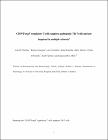| dc.contributor.author | Fletcher, Jean | en |
| dc.contributor.author | Mills, Kingston | en |
| dc.contributor.author | O'Farrelly, Cliona | en |
| dc.date.accessioned | 2010-12-20T11:08:02Z | |
| dc.date.available | 2010-12-20T11:08:02Z | |
| dc.date.issued | 2009 | en |
| dc.date.submitted | 2009 | en |
| dc.identifier.citation | Fletcher JM, Lonergan R, Costelloe L, Kinsella K, Moran B, O'Farrelly C, Tubridy N, Mills KH, CD39+Foxp3+ regulatory T Cells suppress pathogenic Th17 cells and are impaired in multiple sclerosis., Journal of Immunology, 183, 11, 2009, 7602-7610 | en |
| dc.identifier.issn | 0022-1767 | en |
| dc.identifier.other | Y | en |
| dc.identifier.uri | http://hdl.handle.net/2262/48062 | |
| dc.description | PUBLISHED | en |
| dc.description.abstract | Despite the fact that CD4+CD25+Foxp3+ regulatory T cells (Treg cells) play a central role in
maintaining self-tolerance and that IL-17-producing CD4+ T cells (Th17 cells) are pathogenic in
many autoimmune diseases, evidence to date has indicated that Th17 cells are resistant to
suppression by human Foxp3+ Treg cells. It was recently demonstrated that CD39, an
ectonucleotidase which hydrolyses ATP, is expressed on a subset of human natural Treg cells.
We found that although both CD4+CD25hiCD39+ and CD4+CD25hiCD39- T cells suppressed
proliferation and IFN-g production by responder T cells, only the CD4+CD25hiCD39+, which
were predominantly FoxP3+, suppressed IL-17 production, whereas CD4+CD25hiCD39- T cells
produced IL-17. An examination of T cells from multiple sclerosis (MS) patients revealed a
normal frequency of CD4+CD25+CD127loFoxP3+, but interestingly a deficit in the relative
frequency and the suppressive function of CD4+CD25+CD127loFoxP3+CD39+ Treg cells. The
mechanism of suppression by CD39+ Treg cells appears to require cell contact and can be
duplicated by adenosine, which is produced from ATP by the ectonucleotidases CD39 and
CD73. Our findings suggest that CD4+CD25+Foxp3+CD39+ Treg cells play an important role in
constraining pathogenic Th17 cells and their reduction in MS patients might lead to an inability
to control IL-17 mediated autoimmune inflammation. | en |
| dc.description.sponsorship | This work was supported by The Irish Health Research Board (JF) and Science Foundation
Ireland (KM). | en |
| dc.format.extent | 7602-7610 | en |
| dc.language.iso | en | en |
| dc.relation.ispartofseries | Journal of Immunology | en |
| dc.relation.ispartofseries | 183 | en |
| dc.relation.ispartofseries | 11 | en |
| dc.rights | Y | en |
| dc.subject | Immunology | en |
| dc.subject | T cells (Treg cells) | en |
| dc.subject | CD39+Foxp3+ | en |
| dc.title | CD39+Foxp3+ regulatory T Cells suppress pathogenic Th17 cells and are impaired in multiple sclerosis. | en |
| dc.type | Journal Article | en |
| dc.type.supercollection | scholarly_publications | en |
| dc.type.supercollection | refereed_publications | en |
| dc.identifier.peoplefinderurl | http://people.tcd.ie/millsk | en |
| dc.identifier.peoplefinderurl | http://people.tcd.ie/ofarrecl | en |
| dc.identifier.peoplefinderurl | http://people.tcd.ie/fletchj | en |
| dc.identifier.rssinternalid | 62625 | en |
| dc.identifier.doi | http://dx.doi.org/10.4049/jimmunol.0901881 | en |
| dc.subject.TCDTheme | Immunology, Inflammation & Infection | en |
| dc.subject.TCDTheme | Neuroscience | en |
| dc.identifier.rssuri | http://dx.doi.org/10.4049/jimmunol.0901881 | en |
| dc.identifier.orcid_id | 0000-0003-3646-8222 | en |
| dc.contributor.sponsor | Health Research Board (HRB) | en |





